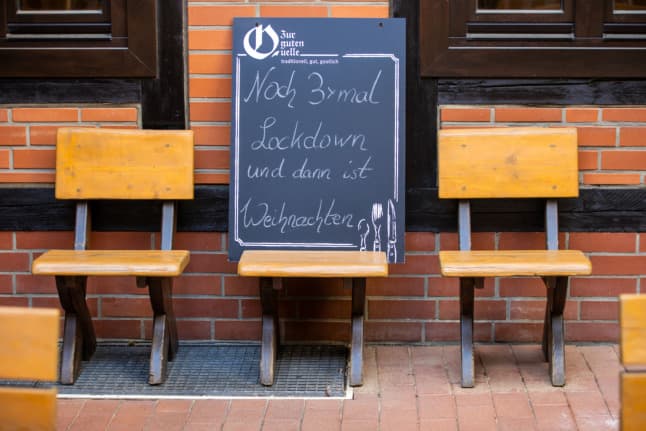Could German states order bar and restaurant closures under new Covid laws?

After two rounds of emergency meetings, Germany's incoming government is set to make another set of changes to the Infection Protection Act in order to give regional leaders more powers to fight the Covid fourth wave. Here's what you need to know.
What's going on?
A few days before Germany's new government is set to enter power, debates are still raging over whether a new set of Covid restrictions go far enough to dampen the impact of the fourth wave.
At crisis talks held last week on Tuesday and Thursday, state leaders pushed the incoming SPD, Green and FDP coalition to give them more instruments for dealing with high Covid incidences - including the ability to order business closures and curfews.
As well as bringing new measures such as nationwide 2G - access only for people who are vaccinated or recovered - in non-essential shops and other public venues, the federal government agreed to amend the Infection Protection Act once again to allow states to take "appropriate additional measures" to tackle Covid. These include closing pubs and restaurants, banning large gatherings and the sale or consumption of alcohol, and restricting overnight stays in hotel.
According to German media reports, the new government has produced a draft of the changes that will be discussed in parliament on Tuesday and Friday, with the aim of putting them into law by the middle of next week.
READ ALSO: KEY POINTS: Germany’s new Covid rules to fight fourth wave
Will states be able to order lockdowns?
Not exactly - though they can go halfway. According to the draft, state governments will have the power to ban large events and gatherings if the 7-day incidence of Covid infections reaches a critical level. That means that football matches, concerts and conferences can be all be cancelled under the new rules - though political demonstrations are still allowed.
They will also have the power to order the closure of hospitality, leisure and cultural venues for a restricted period of time - but again, only if the 7-day incidence of infections is particularly high. The recently amended Infection Protection Act had ruled out the blanket closures of businesses, meaning that states have so far been unable to close clubs and bars even when infections were spiralling.
READ ALSO: Berlin tightens Covid rules with dancing ban
The amended clause being discussed this week now states that the closure of trade, retail or wholesale businesses should be prohibited in the future "unless they are catering establishments, leisure or cultural facilities or trade fairs or congresses" - so while restaurants and bars could be forced to shut their doors, you'll probably still be able to go shopping or work out at the gym.
If states do go down this route, however, they'll have to run the new measures past parliament first.
Couldn't they do this before?
Before the 'epidemic situational of national importance' was allowed to expire on November 25th, states were able to order measures like lockdowns, curfews, regional travel bans and blanket business closures without consulting parliament.
When the epidemic situation expired, however, states lost the legal basis for putting these strict measures in place. They were given a few of these powers - such as the ability to impose entry restrictions and mandatory masks - back in an amendment to the Infection Protection Act. But, as we mentioned, the amendments also included a clause forbidding blanket closures of schools and businesses, which has now been edited slightly to allow the closure of hospitality businesses.

Empty streets in the town of Aalen, Baden-Württemberg. Photo: picture alliance/dpa | Stefan Puchner
What about the states that are already in lockdown?
That's a slightly different matter. Some states, like Saxony and Bavaria, went into partial lockdown while the 'epidemic situation of national importance' was still in place, but were initially only allowed to stay in lockdown until December 15th.
Under the new draft law, these states will now be allowed to extend their lockdowns until at least February 15th next year, should they choose to.
READ ALSO: Germany to impose sweeping new Covid curbs on the unvaccinated
Anything else?
A few weeks ago, the new government brought in testing obligations for employees and visitors in doctors' surgeries, clinics and nursing homes.
Now, the draft has been changed to clarify that patients and "accompanying persons who only enter the facility or company for an insignificant period of time" are not considered visitors - i.e. parents at the paediatrician's or assistants for people with disabilities. There had previously been confusion about this in some states.
In addition, there are plans to introduce a vaccine mandate for medical professionals and carers from March 15th next year, as well as offering permits to vets, dentists and pharmacists that will allow them to administer Covid jabs.
Comments
See Also
What's going on?
A few days before Germany's new government is set to enter power, debates are still raging over whether a new set of Covid restrictions go far enough to dampen the impact of the fourth wave.
At crisis talks held last week on Tuesday and Thursday, state leaders pushed the incoming SPD, Green and FDP coalition to give them more instruments for dealing with high Covid incidences - including the ability to order business closures and curfews.
As well as bringing new measures such as nationwide 2G - access only for people who are vaccinated or recovered - in non-essential shops and other public venues, the federal government agreed to amend the Infection Protection Act once again to allow states to take "appropriate additional measures" to tackle Covid. These include closing pubs and restaurants, banning large gatherings and the sale or consumption of alcohol, and restricting overnight stays in hotel.
According to German media reports, the new government has produced a draft of the changes that will be discussed in parliament on Tuesday and Friday, with the aim of putting them into law by the middle of next week.
READ ALSO: KEY POINTS: Germany’s new Covid rules to fight fourth wave
Will states be able to order lockdowns?
Not exactly - though they can go halfway. According to the draft, state governments will have the power to ban large events and gatherings if the 7-day incidence of Covid infections reaches a critical level. That means that football matches, concerts and conferences can be all be cancelled under the new rules - though political demonstrations are still allowed.
They will also have the power to order the closure of hospitality, leisure and cultural venues for a restricted period of time - but again, only if the 7-day incidence of infections is particularly high. The recently amended Infection Protection Act had ruled out the blanket closures of businesses, meaning that states have so far been unable to close clubs and bars even when infections were spiralling.
READ ALSO: Berlin tightens Covid rules with dancing ban
The amended clause being discussed this week now states that the closure of trade, retail or wholesale businesses should be prohibited in the future "unless they are catering establishments, leisure or cultural facilities or trade fairs or congresses" - so while restaurants and bars could be forced to shut their doors, you'll probably still be able to go shopping or work out at the gym.
If states do go down this route, however, they'll have to run the new measures past parliament first.
Couldn't they do this before?
Before the 'epidemic situational of national importance' was allowed to expire on November 25th, states were able to order measures like lockdowns, curfews, regional travel bans and blanket business closures without consulting parliament.
When the epidemic situation expired, however, states lost the legal basis for putting these strict measures in place. They were given a few of these powers - such as the ability to impose entry restrictions and mandatory masks - back in an amendment to the Infection Protection Act. But, as we mentioned, the amendments also included a clause forbidding blanket closures of schools and businesses, which has now been edited slightly to allow the closure of hospitality businesses.

Empty streets in the town of Aalen, Baden-Württemberg. Photo: picture alliance/dpa | Stefan Puchner
What about the states that are already in lockdown?
That's a slightly different matter. Some states, like Saxony and Bavaria, went into partial lockdown while the 'epidemic situation of national importance' was still in place, but were initially only allowed to stay in lockdown until December 15th.
Under the new draft law, these states will now be allowed to extend their lockdowns until at least February 15th next year, should they choose to.
READ ALSO: Germany to impose sweeping new Covid curbs on the unvaccinated
Anything else?
A few weeks ago, the new government brought in testing obligations for employees and visitors in doctors' surgeries, clinics and nursing homes.
Now, the draft has been changed to clarify that patients and "accompanying persons who only enter the facility or company for an insignificant period of time" are not considered visitors - i.e. parents at the paediatrician's or assistants for people with disabilities. There had previously been confusion about this in some states.
In addition, there are plans to introduce a vaccine mandate for medical professionals and carers from March 15th next year, as well as offering permits to vets, dentists and pharmacists that will allow them to administer Covid jabs.
Join the conversation in our comments section below. Share your own views and experience and if you have a question or suggestion for our journalists then email us at [email protected].
Please keep comments civil, constructive and on topic – and make sure to read our terms of use before getting involved.
Please log in here to leave a comment.